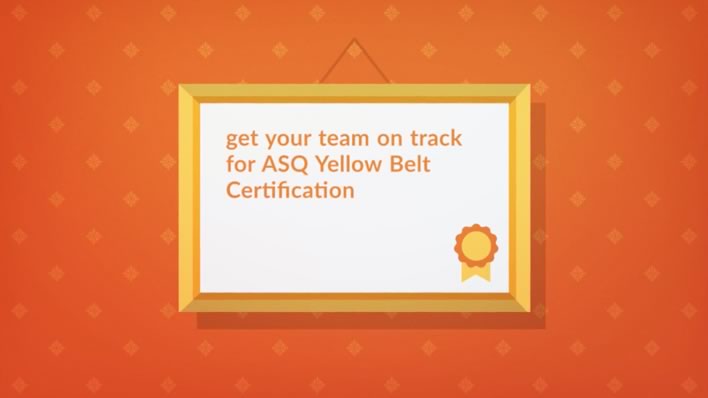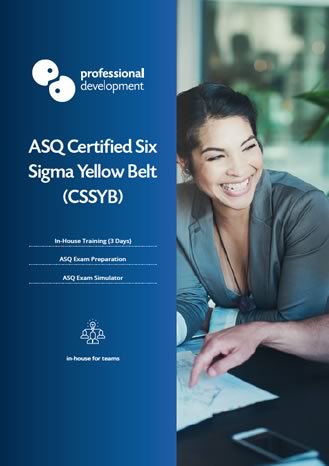ASQ Certified Six Sigma Yellow Belt Course
Public Courses » ASQ Certified Six Sigma Yellow Belt Course- Exam Prep: This is an intensive exam preparation course for ASQ Certified Six Sigma Yellow Belt.
- Understanding: We introduce participants to the ASQ Body of Knowledge for Yellow Belts.
- For Teams: It is exclusively available for in-house bookings. Want to attend a public course?
- Expert Trainers: Our lean six sigma trainers are skilled, experienced, qualified professionals.
- Flexible: We work with you to plan training dates that suit your team and your schedule best.
Choose your training delivery style:
In-HouseTraining exclusively for your team
ASQ Certified Six Sigma Yellow Belt
- Style: Exam Preparation
- Duration: 3 Days
- In-House: Tailored training for teams
- Styles: Classroom or Virtual
- Locations: Online or Onsite
This 3-day ASQ Certified Six Sigma Yellow Belt programme is ideal for any organisation seeking to introduce a culture of continuous improvement. The combination of practical learning and exam preparation gives your team a well-rounded introduction to best-practice approaches with Six Sigma.
What is Covered during this Yellow Belt Course?
We follow the syllabus for the ASQ Certified Six Sigma Yellow Belt (CSSYB) exam, which covers the core competencies Yellow Belts require in order to support quality process improvement projects. You can read a detailed outline in the “Course Content” tab below.
How does this ASQ Certified Six Sigma Yellow Belt Training Work?
Trusted by Leading Irish and International Companies
Download Brochure
Get Your Brochure Instantly
ASQ Certified Six Sigma Yellow Belt Course- More about this course
- Discover key benefits
- Top training objectives
- Detailed course content
- Understand delivery styles
- How to get started
What is the focus of this ASQ Certified Six Sigma Yellow Belt Course?
This course is a blend of introducing your team to the ASQ Body of Knowledge for Yellow Belts and preparing the team to sit their CSSYB exam. On completion of this intensive exam preparation programme, participants will:
- Be prepared to undertake the ASQ Certified Six Sigma Yellow Belt (CSSYB) exam, which is based on the ASQ Body of Knowledge for Yellow Belts (Knowledge and Blooms Taxonomy levels are defined in the ASQ SSYB BOK).
- Gain a firm knowledge of the ASQ Body of Knowledge for Yellow Belts.
- Learn the tools and techniques to support quality improvement projects at yellow belt level.
What are the Benefits?
Organisational Benefits
Introduce methods for lowering costs and waste, streamlining processes and efficiency, and increasing profit margin.Team Benefits
Each member of each team will be confident and able to support both green and black belts in process improvement projects.Leadership Benefits
Managers and Directors will have a clear understanding of Six Sigma and how it can be applied to the organisation.Individual Benefits
Gain practical, versatile process improvement skills that are sought-after by organisations in all sectors.
Online or Classroom
We offer this ASQ Certified Six Sigma Yellow Belt training in both classroom and online training formats. Classroom means we come to you at your premises or a venue nominated by you. Online here refers to live virtual training. These are real-time, trainer-led sessions that your team can connect to from wherever they are based. This is an excellent solution for remote working teams.
Download our PDF brochure for more information about the delivery style of this course.
Want to Find out More?
You can contact us by Freephone on 1800 910 810, or click below to ask a quick question. We'll be happy to provide the best training solution for your team.
What is covered during this ASQ Certified Six Sigma Yellow Belt Course?
You can read through our standard ASQ Certified Six Sigma Yellow Belt content below. Although we must adhere to the exam preparation syllabus, we can customise the content to focus on situations and processes relevant to your business. Get a tailored quote to find out how this would work in your business.
Module 1 - Six Sigma Fundamentals
- Six Sigma foundations and principles
- Lean foundations and principles
- Six Sigma roles and responsibilities
- Team basics
- types of teams
- stages of development
- decision-making tools: brainstorming, multivoting, nominal group technique (NGT)
- communication methods
- Quality tools and Six Sigma metrics
- quality tools throughout the DMAIC process: pareto charts, cause and effect diagrams, flowcharts, run charts, check sheets, scatter diagram, histograms
- Six Sigma metrics throughout the DMAIC process
- defects per unit (DPU)
- defects per million opportunities (DPMO)
- rolled throughout yield
- cycle time
- cost of poor quality (COPQ)
Exam Questions and Answers
Module 2 - Define Phase
Project Identification
Voice of the Customer
- Customer needs
- Critical-to-quality (CTQ) characteristics
Project Management (PM) Basics
- Project charter
- Communication plan
- Project planning
- work breakdown structure (WBS)
- Gantt charts
- Project Management tools
- activity network diagrams
- affinity diagrams
- matrix charts
- relations charts
- tree diagrams
- Phase reviews
- tollgate or phase reviews
Exam Questions and Answers
Module 3 - Measure Phase
Basic statistics
- Central tendency
- mean
- median
- mode
- Measures of dispersion
- standard deviation
- range
- variance
Data Collection
- Data collection plans
- Qualitative and quantative data
- Data collection techniques
- surveys
- interviews
- check sheets
- checklists
Measurement System Analysis (MSA)
- MSA terms
- precision
- accuracy
- bias
- linearity
- stability
- Gauge repeatability and reproducibility (GR&R)
Exam Questions and Answers
Module 4 - Analyze Phase
Process Analysis Tools
- Lean tools
- 5s
- value analysis
- Failure modes and effect analysis (FMEA)
Root cause analysis
- 5 whys
- Process mapping
- Force-field analysis
- Matrix charts
Data Analysis
- Basic distribution types
- normal and binomial distributions
- shapes (skewed and bimodal)
- Common and special cause variation
Correlation and Regression
- Correlation
- relationships between variables
- Regression
- how regression analysis is used to predict outcomes
Hypothesis Testing
- Null and alternative
- Type I and type II error
- P-value and power
Exam Questions and Answers
Module 5 - Improve & Control Phase
Improvement Techniques
- Kaizen and kaizen blitz
- Plan-do-check-act (PDCA) cycle
- Cost-benefit analysis
Control Tools and Documentation
- Control plan
- Control charts
- X-R charts
- Document control
Exam Questions and Answers
Public Courses for Lean Six Sigma Certification
Our ASQ Six Sigma Yellow Belt programme is only available for group or in-house bookings. We have several great alternatives for those who want to attend a public course for individuals.
Lean Six Sigma Yellow Belt
This 2-day Yellow Belt training is ideal for anyone who wants to begin learning about Lean and Six Sigma, while achieving a yellow belt certification.
Get Course Brochure View Course
Lean Six Sigma Green Belt
Our Green Belt Training is an great choice for those who want a confident understanding of Lean Six Sigma methods, and would like to achieve a green belt certification through training as an individual.
Get Course Brochure View Course
ASQ Certified Six Sigma Black Belt (CSSBB)
This Black Belt programme is designed for those who are experienced with Lean Six Sigma practices. Our intensive programme prepares you to sit the prestigious ASQ Certified Six Sigma Black Belt exam.
Get Course Brochure View Course
Which Course for You?
If you’re not sure which course is the best fit for your next step, why not get advice from our experienced consultants? You can reach us by phone (Freephone 1800 910 810), or by clicking below to ask a question or ask which course is right for you.













